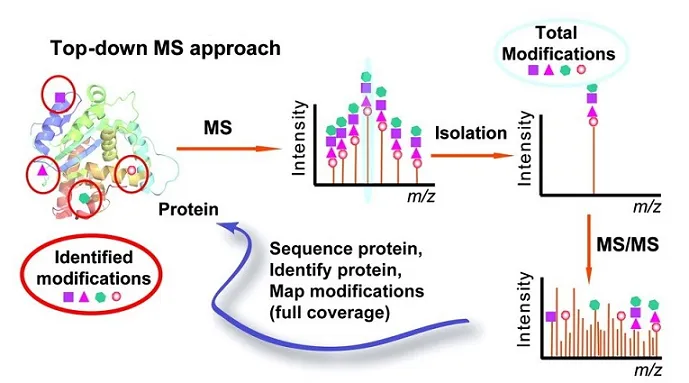Top-Down Based Glycoprotein Analysis Service
MtoZ Biolabs provides Top-Down Based Glycoprotein Analysis Service to deliver rapid and comprehensive characterization of intact glycoproteins. By combining advanced ESI-MS and MALDI-TOF MS platforms with optimized enrichment strategies, we enable direct determination of molecular weight, glycoform heterogeneity, and global glycosylation patterns without the need for peptide digestion. Our tailored workflows offer reliable insights into therapeutic antibodies, recombinant proteins, and clinical samples, supporting applications in biopharmaceutical development, biomarker discovery, and disease mechanism research.
Overview
Traditional glycoprotein analysis methods typically rely on bottom-up approaches, in which proteins are enzymatically digested into glycopeptides before mass spectrometry (MS) analysis. While powerful, these methods can be time-consuming, require extensive sample preparation, and sometimes fail to capture the complete glycosylation landscape of intact proteins.
Top-down glycoprotein analysis provides a complementary and increasingly valuable strategy. Instead of digesting proteins into peptides, intact glycoproteins are directly analyzed, allowing the characterization of the full molecular weight distribution, glycoform heterogeneity, and glycosylation profiles in a single experiment. This approach minimizes sample preparation, reduces analysis time, and preserves global structural information that is often lost in bottom-up workflows.

Zhang, H. et al. Circ Cardiovasc Genet. 2011.
Figure 1. Top-Down PTMs Analysis
Technical Principles
The top-down approach analyzes intact glycoproteins directly without enzymatic digestion. Using high-resolution MS platforms such as electrospray ionization mass spectrometry (ESI-MS) and matrix-assisted laser desorption/ionization time-of-flight MS (MALDI-TOF MS), the intact molecular species of glycoproteins are ionized and detected. The observed molecular weights correspond to protein backbones modified with specific glycans. By subtracting the known protein mass and interpreting the mass differences, the glycan composition and degree of glycosylation can be determined. Advanced fragmentation techniques can also be applied to resolve glycoform distributions and map structural heterogeneity. This principle allows the identification of complete glycoprotein profiles, including molecular weight, glycan load, and overall structural diversity, within minutes.
Analysis Workflow
The general analytical workflow for the Top-Down Based Glycoprotein Analysis Service is as follows:
1. Sample Preparation
Purified glycoproteins or enriched protein fractions are prepared under optimized conditions with minimal processing to preserve intact structures.
2. Protein Enrichment
When necessary, affinity-based enrichment methods are applied to increase detection sensitivity for target glycoproteins.
3. Mass Spectrometry Detection
Intact glycoproteins are directly analyzed using high-resolution platforms such as ESI-MS or MALDI-TOF MS to determine molecular weight distributions and glycoform heterogeneity.
4. Data Analysis
Spectral data are processed with bioinformatics tools to identify glycoforms, quantify heterogeneity, and provide comprehensive glycoprotein profiles.
5. Reporting
Provide a complete report including experimental procedures, raw data and data analysis.
Service Advantages
1. Rapid and Direct Analysis
Intact glycoproteins can be analyzed within minutes without lengthy digestion or separation steps.
2. Comprehensive Coverage
Top-Down Based Glycoprotein Analysis Service provides a full overview of molecular weight distribution and glycoform heterogeneity at the protein level.
3. High Sensitivity and Accuracy
Advanced ESI-MS and MALDI-TOF MS platforms ensure robust detection of diverse glycoprotein forms.
4. Complementary Insights
Offers unique structural information not captured by bottom-up approaches, enhancing overall glycoprotein characterization.
Sample Submission Suggestions

It is recommended to contact our technical support team before submitting samples to determine sample suitability and obtain tailored submission guidelines.
Applications
Application examples for Top-Down Based Glycoprotein Analysis Service:
1. Monoclonal Antibody Characterization
Top-down analysis provides rapid insight into Fc glycosylation and global glycoform profiles critical for therapeutic antibody quality.
2. Clinical Research
Enables rapid screening of intact glycoproteins in serum, plasma, or tissue samples to uncover potential diagnostic markers.
3. Complementary to Bottom-Up Methods
Provides global intact glycoprotein information that complements site-specific glycopeptide analysis, supporting a more comprehensive characterization strategy.







